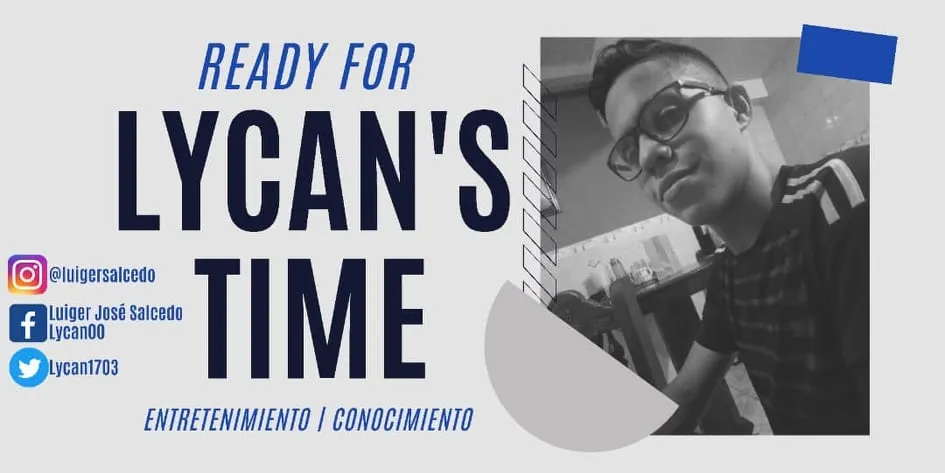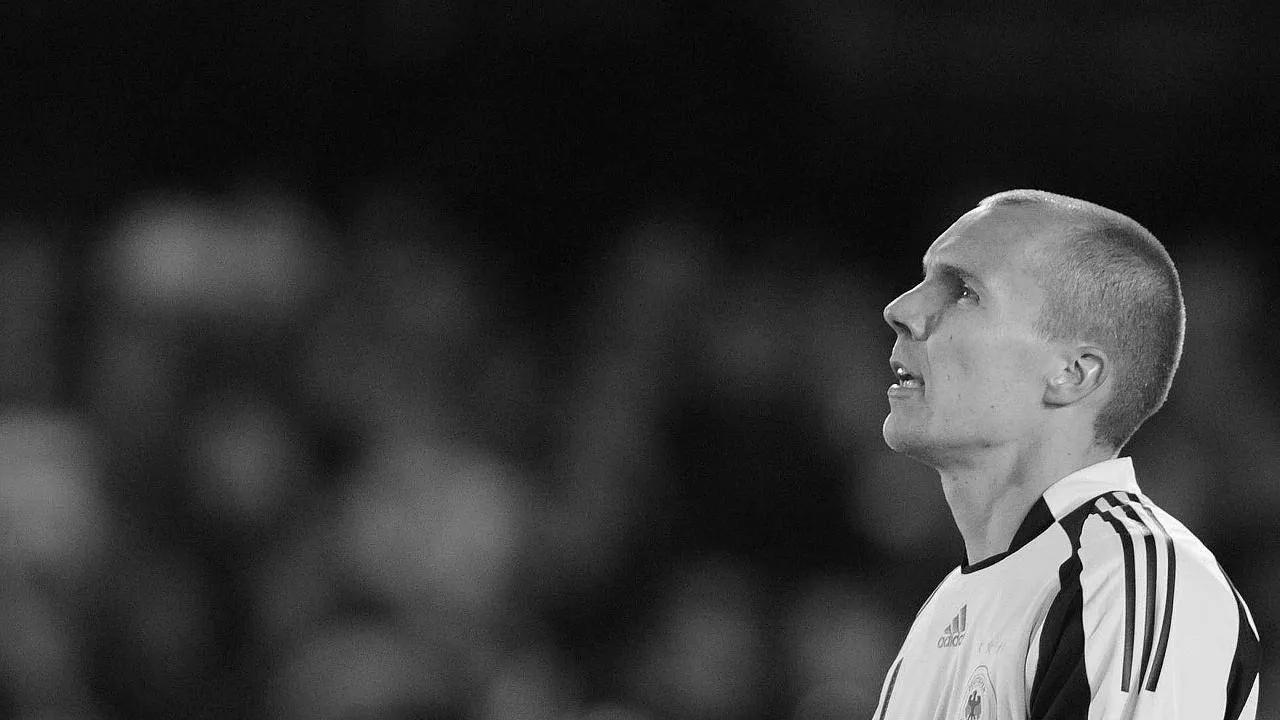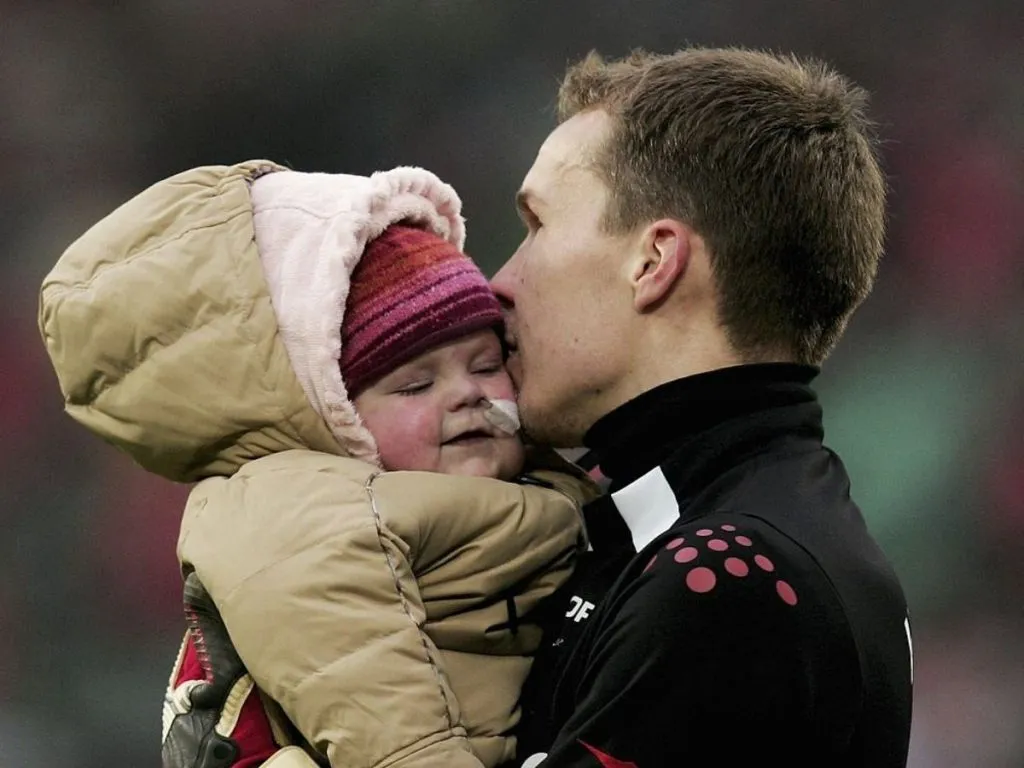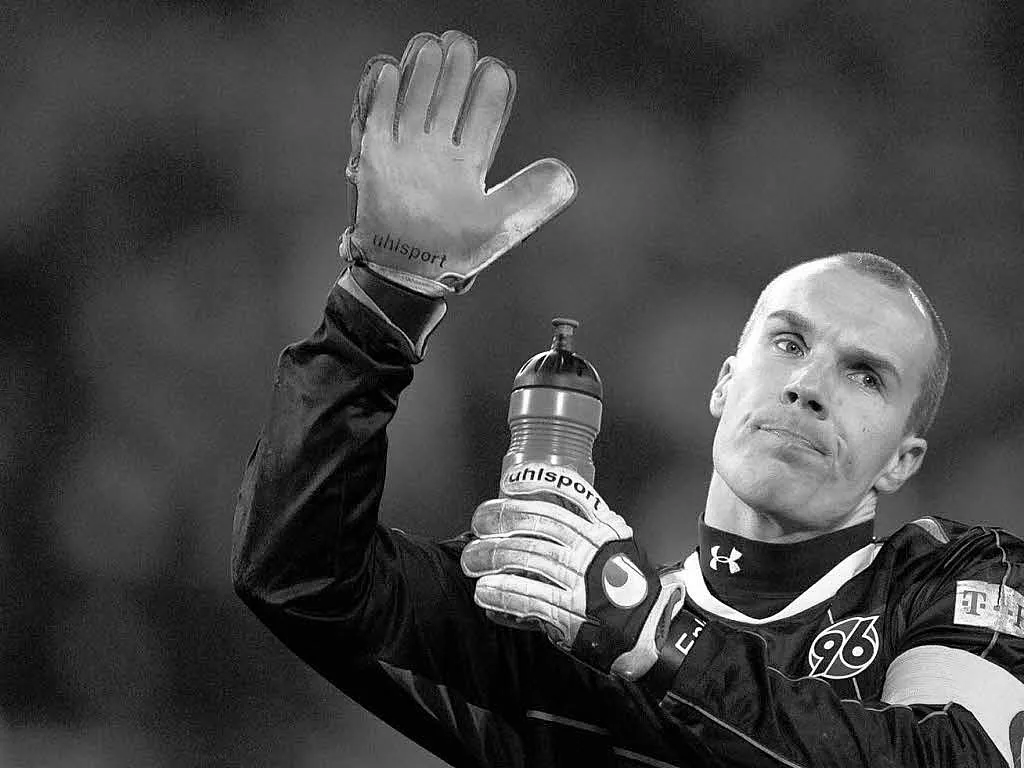Como un futbolista puede volverse tan importante en la lucha contra una de las enfermedades que más vidas cobra cada año.
How a footballer can become so important in the fight against one of the diseases that takes the most lives every year.

La máscara de Enke. - Enke's mask

La vida, la muerte y la libertad son los temas que rodean al cuestionamiento más filosófico de nuestra existencia según David Hume, el suicidio ¿por qué llevar una vida que en su gran mayoría esta llena de amarguras y sufrimiento? cuando las personas no encuentran la salida o los motivos para continuar, el primer pensamiento que llega a nosotros es ¿y si en la muerte me siento mejor? La ajetreada vida que ha venido adoptando la humanidad durante las últimas décadas ha aumentado enormemente los índices de depresión, algo preocupante, por eso, personajes como Robert Enke, son emblemas tan importantes a la hora de hacer consciencia sobre uno de los peores males que puede asechar en la mente humana. Enke nació el 24 de agosto de 1977 en una fría y separada Alemania, él, había nacido en la Oriental, en una época poco alegre y llena de incertidumbre y penumbras, en la ciudad de Jena, encontrando en el fútbol una manera de alejarse de todos estos problemas, inició su carrera en el pequeño club local, el FC. Carl Zeuss Jena, debutando a los 18 años, debido a la mala forma del titular Mario Neumann quien recibiera 14 goles en tan solo 3 partidos, Enke contaba con un buen tamaño y con grandes relejos, disputó tres partidos con el equipo antes de perder nuevamente la titularidad con Neumann y no aparecer más en el marco titular en toda la campaña, esto fue suficiente, lo cual le valió para que Borussia Monchengladbach decidiera firmarle tan solo un año después de su debut, Enke estuvo durante 3 temporadas en el club alemán dejando gratas impresiones y llamando la atención del FC Barcelona de holandés Louis Van Gaal, que se lanzó a por él y acabó obteniendo su fichaje, sin embargo, el técnico Van Gaal no le utilizó mucho y tras solo cuatro partidos oficiales decidió emigrar a Tenerife y luego a Portugal con el Benfica, luego, tras un rápido paso por el Fenerbahce turco, volvió a Alemania y encontró su lugar en el mundo en el Hannover 96, el club le acogería durante 5 años con una calidez única, que Enke no había sentido jamás en toda su carrera, sin embargo, para este punto, Enke ya arrastraba problemas depresivos, que iniciaron cuando fue relegado al banquillo del FC Barcelona por un desconocido joven catalán de nombre Víctor Valdés, explica el periodista Ronald Reng que en Barcelona no tenía ni un solo amigo y los rumores de que Valdés era titular solo por ser catalán le causaban problemas a Enke, Ronald señala también que Robert era una persona muy dura consigo misma, se echaba en cara sus errores, los exageraba y en ocasiones se autoinculpaba, por fuera, parecía ser un roble con su aspecto serio y frío, pero por dentro era muy vulnerable y vivía largos períodos de angustia, Robert jamás expuso sus problemas depresivos por miedo al rechazo y eso hizo que no pudiera recibir la ayuda que necesitaba, señala Ronald que el mundo del fútbol, competitivo a más no poder no deja espacio a aquellos que llegan a sentirse mal o débiles, la máscara del más fuerte arrasa con cualquier individualidad.
Life, death and freedom are the themes that surround the most philosophical questioning of our existence according to David Hume, suicide, why lead a life that is mostly full of bitterness and suffering? When people do not find the way out or the reasons to continue, the first thought that comes to us is what if in death I feel better? The busy life that humanity has been adopting during the last decades has greatly increased the rates of depression, something worrying, that is why, characters like Robert Enke, are such important emblems when it comes to raising awareness about one of the worst evils that can lurk in the human mind. Enke was born on August 24, 1977 in a cold and separate Germany, he had been born in the East, at a time not very happy and full of uncertainty and gloom, in the city of Jena, finding in football a way to get away from All these problems, he started his career in the small local club, FC. Carl Zeuss Jena, debuting at age 18, due to the bad form of the starter Mario Neumann who received 14 goals in just 3 games, Enke had a good size and with great reflexes, he played three games with the team before losing again the ownership with Neumann and not appearing any more in the starting frame throughout the campaign, this was enough, which led to Borussia Monchengladbach deciding to sign him just one year after his debut, Enke was for 3 seasons in the German club leaving Pleasant impressions and drawing the attention of the Dutch FC Barcelona Louis Van Gaal, who threw himself at him and ended up obtaining his signing, however, coach Van Gaal did not use him much and after only four official matches he decided to emigrate to Tenerife and then to Portugal with Benfica, then, after a quick stint at Turkish Fenerbahce, he returned to Germany and found his place in the world at Hannover 96, the club would welcome him for 5 years with a unique warmth , which Enke had never felt in his entire career, yet, at this point, Enke was already dragging depressive problems, which began when he was relegated to the bench of FC Barcelona by an unknown young Catalan named Víctor Valdés, explains the journalist Ronald Reng that in Barcelona he did not have a single friend and the rumors that Valdés He was a starter just because he was Catalan, they caused Enke problems, Ronald also points out that Robert was a very hard person with himself, he blamed his mistakes, exaggerated them and sometimes blamed himself, on the outside, he seemed to be an oak with his appearance serious and cold, but inside he was very vulnerable and lived long periods of anguish, Robert never exposed his depressive problems for fear of rejection and that made him not be able to receive the help he needed, Ronald points out that the world of football, competitive at more Not being able does not leave room for those who come to feel bad or weak, the mask of the strongest destroys any individuality.
El golpe definitivo. - The final blow.

Los problemas de autoestima en el ámbito futbolístico parecían ser signos de un problema mental más grave, pero tras el golpe recibido en 2006 cuando Enke perdió a su hija de dos años tras meses de lucha contra un problema de corazón, más específicamente, contra el síndrome del corazón izquierdo hipoplásico, todo se agravó aún más, la pareja adoptaría a otra pequeña, pero Robert jamás se repondría en lo más mínimo de aquella gran pérdida, tras su paso por el Fenerbahce los problemas con el miedo al fracaso se agigantaron y tras la muerte de la pequeña, Robert volvió a acudir al médico por causa de la depresión, con el pasar de las terapias todo parecía mejorar, incluso consiguió debutar con la selección de fútbol de Alemania el 28 de marzo de 2007 ante Dinamarca, cayendo derrotados por 0-1, tras el retiro del legendario Oliver Kahn y el bajón de nivel de Jens Lehman, Enke se dirigía a gran velocidad a la titularidad de la selección alemana, fue suplente de Lehmann en la Eurocopa de 2008 y vivió de cerca el sumbcampeonato obtenido frente a España, estaba siendo titular en las clasificatorias europeas para la Copa Mundial de Fútbol de Sudáfrica 2010 donde indiscutiblemente sería titular, pero sep erdió los últimos cuatro partidos clasificatorios por una supuesta infección intestinal la cual se descubrió fue una excusa de Enke quien no quiso disputar los encuentros por la depresión, Enke era muy activo en las labores a favor de los derechos de animales, de hecho, prestó su imagen a la organización por los derechos de los animales PETA, el 10 de noviembre de 2009, Enke avisa a su esposa, Teresa, que volvería tarde a casa a causa del entrenamiento, y como siempre, silencioso, la depresión atacó una vez más, pero en esta ocasión fue mortal, Enke no resistió más su lucha contra sí mismo y decidió acabar con ella al arrojarse a las vías de un tren en movimiento en un paso a nivel en la localidad de Neustadt am Rubenberge, en las cercanías de la ciudad de Hanóver, de inmediato, su suicidio causó conmoción en el fútbol alemán y en todos los países con cultura futbolera del mundo, cientos de fanes del Hannover y del propio Enke se reunieron a las afueras del AWD-Arena para dejar flores y velas en conmemoración al arquero alemán.
Self-esteem problems in the football field seemed to be signs of a more serious mental problem, but after the blow received in 2006 when Enke lost his two-year-old daughter after months of battling a heart problem, more specifically, against the syndrome of the hypoplastic left heart, everything worsened even more, the couple would adopt another little girl, but Robert would never recover in the least from that great loss, after his time at Fenerbahce the problems with the fear of failure increased and after the Death of the little girl, Robert returned to go to the doctor because of depression, with the passing of the therapies everything seemed to improve, he even managed to make his debut with the German soccer team on March 28, 2007 against Denmark, falling defeated by 0 -1, after the retirement of the legendary Oliver Kahn and the drop in level of Jens Lehman, Enke was heading at great speed to the title of the German team, he was a substitute for Lehmann in the Euro 200 8 and lived closely the runner-up against Spain, he was starting in the European qualifiers for the Soccer World Cup in South Africa 2010 where he would indisputably start, but he lost the last four qualifying matches due to a supposed intestinal infection which was discovered It was an excuse from Enke who did not want to dispute the meetings due to the depression, Enke was very active in the work in favor of animal rights, in fact, he lent his image to the organization for animal rights PETA, on 10 November 2009, Enke warns his wife, Teresa, that he would be coming home late because of training, and as always, silent, depression struck once more, but this time it was deadly, Enke no longer resisted his fight against himself himself and decided to end it by throwing himself onto the tracks of a moving train at a level crossing in the town of Neustadt am Rubenberge, near the city of Hanover, immediately His suicide caused a stir in German football and in all the countries with a football culture in the world. Hundreds of fans from Hanover and from Enke himself gathered outside the AWD-Arena to leave flowers and candles in commemoration of the German archer.
Fundación Robert Enke. - Robert Enke Foundation.

Tal fue el impacto del deceso de Enke que la canciller Angela Merkel se pronunció al respecto, haciendo un llamado de consciencia sobre la depresión y dando sus condolencias a su familia, mientras que la plantilla alemana se vio tan afectada que no pudo disputar el partido amistoso ante Chile que se iba a disputar 4 días después, en Alemania, empezaron a hacer eco las voces de los miles de suicidios acontecidos en el país tras la Segunda Guerra Mundial. Después de la muerte de Robert, los clubes por los que pasó le rindieron sentidos homenajes y el Hannover 96 y la DFL participaron en la creación de una fundación en memoria del fallecido portero, la cual se ocuparía principalmente de la salud mental de los jugadores, encargándose de investigar e incentivar la terapia contra la depresión, buscando comprender mejor el fenómeno depresivo clínico para saber como tratarlo, la fundación, a petición de la viuda de Enke, también se encargaría de tratar a niños con problemas cardíacos. Y es que había que crear la fundación, aquel hombre, atajaba delante de 45 mil personas, luciendo tranquilo mientras por dentro moría y no encontraba algún motivo para vivir, sintiendo un vacío tan profundo que nisiquiera la ilusión de jugar una Copa Mundial de Fútbol como titular podía llenar ¿cuál sería el calvario de Enke al levantarse todos los días de la cama a vivir una vida que ya no quería? el mismo de todos aquellos que arrastran el terrible pesar de la depresión, ese sentimiento de pérdida continuo que asecha como sombra y que cuando menos parece que pueda actuar lo hace de forma letal, Enke temía a la vida, pero acabó siendo uno de los personajes más emblemáticos en la lucha contra la depresión, gracias a él se han creado cientos de programas para tratar esto en el ámbito deportivo, la competitividad genera miedo al fracaso y por mucho tiempo esto pasó desapercibido, el arquero de un 1,86 acabó siendo mucho más grande lo que él jamás pensó y sin darse cuenta cambio al mundo, aunque hubiesemos preferido que lo haya hecho estando en vida. Solo me queda decir que espero que Enke al fin pueda encontrar ese consuelo que tanto buscaba, tomen la depresión en serio, acudan al médico, comuniquenlo con alguien de confianza, no se dejen gobernar por el miedo. Un abrazo Hiver´s.
Such was the impact of Enke's death that Chancellor Angela Merkel spoke out about it, calling for conscience about the depression and giving her condolences to her family, while the German squad was so affected that they could not play the friendly match Against Chile, which was to be played 4 days later, in Germany, the voices of the thousands of suicides that occurred in the country after the Second World War began to echo. After Robert's death, the clubs through which he passed paid heartfelt tributes and Hannover 96 and the DFL participated in the creation of a foundation in memory of the late goalkeeper, which would mainly deal with the mental health of the players. In charge of researching and promoting therapy against depression, seeking to better understand the clinical depressive phenomenon in order to know how to treat it, the foundation, at the request of Enke's widow, would also be in charge of treating children with heart problems. And the thing is that the foundation had to be created, that man, stopped in front of 45 thousand people, looking calm while inside he died and did not find any reason to live, feeling an emptiness so deep that not even the illusion of playing a Soccer World Cup like headline could fill what would be Enke's ordeal as he got out of bed every day to live a life he no longer wanted? the same of all those who carry the terrible sorrow of depression, that feeling of continuous loss that lurks like a shadow and that at least seems to be able to act does so in a lethal way, Enke feared life, but ended up being one of the characters most emblematic in the fight against depression, thanks to him hundreds of programs have been created to address this in the sports field, competitiveness generates fear of failure and for a long time this went unnoticed, the 1.86 goalkeeper ended up being a lot bigger than he ever thought and inadvertently changed the world, although we would have preferred that he did it while he was alive. I can only say that I hope that Enke can finally find that consolation that he was looking for so much, take depression seriously, go to the doctor, communicate it with someone you trust, do not allow yourself to be governed by fear. A hug Hiver´s.

